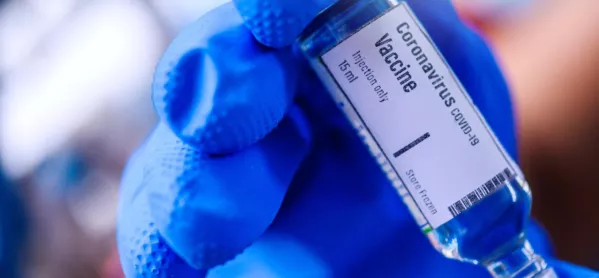Teacher vaccine won’t help schools open says top medic

The government’s deputy chief medical officer has said vaccinating teachers and school staff will not help schools to open more widely.
Speaking at the Commons’ Education Select Committee meeting on the science behind school closures, Jenny Harries said immunisation from Covid-19 for staff was not the “limiting factor” for opening schools to more students.
Warning: DfE testing plan goes against manufacturer’s guidance
Exclusive: Public health directors advise schools against using Covid tests on contacts
Concerns: Scientists say testing plan could increase Covid cases in schools
Currently, schools are closed to all students apart from vulnerable children and the children of key workers until at least after February half-term.
Robert Halfon, chair of the education committee, asked if it could be shown schools could open sooner rather than later, “would that not make the case for vaccinating teachers and support staff a priority” after the most clinically vulnerable?
Dr Harries replied: “The vaccination of staff is not the limiting factor for opening schools, it is community transmission rates.”
She continued: “Once we start to see that decline, we’ll be stepping back probably to some sort of tier system or approach, and schools will reopen.
“They weren’t shut because there was a specific risk in that setting and while I recognise teachers will be concerned, of course, that concern is shared right across a number of our key workers.”
Pressed on whether schools could open more widely sooner if teachers and school staff were vaccinated, Dr Harries said this was a decision for the JCVI (Joint Committee on Vaccination and Immunisation).
“But I cannot see the link between vaccinating staff and the decision to open schools sooner or later; they are not running in the same vein,” she added.
“One is to protect people with clinically severe risks of the disease and fatalities, and the other is about the epidemiology and getting our children back to school as quickly as possible.”
Mr Halfon said that even if a few teachers needed to self-isolate, this could mean further school closures or that year groups or bubbles were sent home.
Dr Harries said this was a “different issue” and that the government did not currently know enough about the vaccination’s impact on transmission rates.
“So in those situations where you have bubbles, a [vaccinated] teacher could still potentially be a transmission risk, and therefore we’d have to rethink the public health system and the control measures around it,” she said.
Yesterday the virologist and Independent Sage member, Deenan Pillay, called for teachers and school staff to be vaccinated before schools reopened more widely.
And last week, education secretary Gavin Williamson said he was fighting “tooth and nail” to make sure teachers and school staff are moved up the priority list to receive a Covid-19 vaccine.
Speaking to the Commons Education Select Committee, he said it was “understandably right” that the government had chosen to prioritise those most at risk of hospitalisation for vaccination.
He added: “But…in that next wave where we have to prioritise others, I will make no apology for the fact that I see the top priority as all those who work in schools.
“Not just teachers but all those that work in schools, because every single one of them is absolutely vital for delivering education.”
Register with Tes and you can read two free articles every month plus you'll have access to our range of award-winning newsletters.
Keep reading with our special offer!
You’ve reached your limit of free articles this month.
- Unlimited access to all Tes magazine content
- Save your favourite articles and gift them to your colleagues
- Exclusive subscriber-only stories
- Over 200,000 archived articles
- Unlimited access to all Tes magazine content
- Save your favourite articles and gift them to your colleagues
- Exclusive subscriber-only stories
- Over 200,000 archived articles